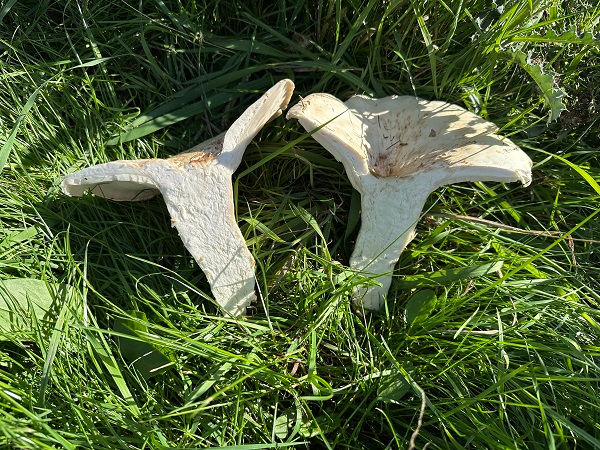Giant funnel - Aspropaxillus giganteus
- The Foraging Course Company
- Oct 1, 2025
- 2 min read

Edible mushroom - novice Season - summer to autumn Common names Giant funnel, giant leucopax
Scientific name meaning: From the Greek apsro, meaning white, and Latin palus, meaning small stake. The specific epithet is from the Greek gigantos - a giant
Habitat  A saprobic fungus found growing in grassland. |
Overall structure and growth  A very large mushroom with a short, stout stem. It grows in rings or troops, often with several fruit bodies overlapping each other. |
Cap  The white or cream coloured cap starts off convex, the cap flattens out and then becomes more funnelled. It can reach up to 40cm or more in diameter. When young, it has an inrolled margin. |
Gills and spores  The crowded, decurrent gills are white to cream coloured. The spore colour is cream. |
Stem  The stem is cylindrical to club shaped and stout for the fruit body size, reaching 10cm in height and 5cm in width. |
Flesh, smell and taste  The flesh is firm and smell is pleasant to slightly raddish-like. The taste is mild |
Possible lookalikes  Could easily be confused for the fleecy milkcap (Lactarius vellereus), pictured, but this will ooze latex from its gills when they are damaged. The trooping funnel (Infundibulicybe geotropa) looks similar and can reach large sizes but it is also edible and tends to have a taller stem. Poisonous funnels reach a cap size less than 15cm so can be elimnated by picking larger specimens. |
Use as a food A good tasting mushroom that should be thoroughly cooked as it can cause gastric upset if undercooked. A tolerance test should be done when first eating this mushroom Hazards Can cause gastric upset in some so a tolereance test is a must
Use in herbal medicine and medicine None known
If you are suffering from any ailment or need medical advice, please see your General Practitioner Other uses None known Importance to other species Food sources of many invertebrates
Always stay safe when foraging. You need to be 100% sure of your identification, 100% sure that your foraged item is edible, and 100% sure that you are not allergic to it (it is good practice to always try a small amount of any new food you are consuming). If in doubt, leave it out!









Comments